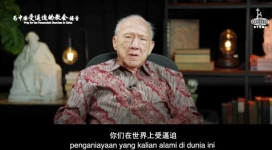
A fresh look at people who volunteer to help others shows they may live longer than those who don’t – depending on their reasons to help, according to a recent report published in the journal Health Psychology.
This is the first time research has shown volunteers' motives can have a significant impact on life span.
“Volunteers lived longer than people who didn't volunteer if they reported altruistic values or a desire for social connections as the main reasons for wanting to volunteer,” said the report titled “Motives for Volunteering Are Associated With Mortality Risk in Older Adults,” published in the American Psychological Association-affiliated Health Psychology journal.
Experts report people who said they volunteered for their own personal satisfaction had the same mortality rate four years later as people who did not volunteer at all, according to the study.
“This could mean that people who volunteer with other people as their main motivation may be buffered from potential stressors associated with volunteering, such as time constraints and lack of pay,” said the study’s lead author Dr. Sara Konrath of the University of Michigan.
Researchers used data from the 1992, 2004, and 2008 Wisconsin Longitudinal Study, which followed a random sample of 10,317 Wisconsin high school graduates from their graduation in 1957 until the present. The WLS asked respondents about their volunteer habits. The researchers also considered the respondents’ physical health, socioeconomic status, marital status, health risk factors, mental health and social support.
The team of researchers for the WLS asked volunteers what their reasons were for wanting to help other people.
Some motives were more oriented toward others, for example: “I feel it is important to help others,” or “Volunteering is an important activity to the people I know best.” Other reasons were more self-oriented including: “Volunteering is a good escape from my own troubles,” or “Volunteering makes me feel better about myself.”
Researchers for the new study about the motivation for volunteering and life span determined how many of the volunteering individuals were still alive.
The results show those who listed a social connection as their predominant motive for volunteering were more likely to be alive compared with non-volunteers.
"This study adds to the existing literature on the powerful effects of social interactions on health and is the first study to our knowledge to examine the effect of motives on volunteers’ subsequent mortality," the report says.
"Volunteers live longer than nonvolunteers, but this is only true if they volunteer for other-oriented reasons."
The Corporation for National and Community Service also reports volunteering leads to greater longevity, higher functional ability, lower rates of depression and less incidence of heart disease.
"Volunteers help themselves to better health while helping others," according to a study by the Corporation for National and Community Service.
The 2007 “Health Benefits of Volunteering: A Review of Recent Research” has found a significant connection between volunteering and good health. The report shows that volunteers have greater longevity, higher functional ability, lower rates of depression and less incidence of heart disease.
“Volunteering makes the heart grow stronger,” said David Eisner, former CEO of the Corporation for National and Community Service. “More than 61 million Americans volunteer to improve conditions for people in need and to unselfishly give of themselves. While the motivation is altruistic, it is gratifying to learn that their efforts are returning considerable health benefits.”
Bill Wilson, president of the Center for Congregational Health in Winston Salem, N.C., says in a column published in the Baptist Press that he has seen, on many occasions, individual believers overcome overwhelming odds and unlikely scenarios to become something more than anyone predicted with the help of others.
Much of the credit for their success is due to the community that infused them with hope, encouragement and accountability.
“Despite our illusions, none of us is capable of living the life God has called us to alone,” Wilson says. “We all need someone, some group, some community to help us fulfill God’s dream for our life. We may be extraordinarily gifted, wealthy, wise, self-sufficient and independent, but in the end, it will not be enough.”
Wilson says there will be a day, if there has not been already, when you will come to a point where you cannot stand alone.
“There is now a convergence of research leading to the conclusion that helping others makes people happier and healthier. So the word is out – it's good to be good. Science increasingly says so,” said Dr. Stephen Post, a professor at the Case Western Reserve University School of Medicine and co-author of the forthcoming book, Why Good Things Happen to Good People: The Exciting New Research That Proves the Link Between Doing Good and Living a Longer, Healthier, Happier Life.
“Civic Engagement and volunteering is the new hybrid health club for the 21st century that's free to join,” added Thomas H. Sander, executive director of the Saguaro Seminar at Harvard University. “Social capital research shows it miraculously improves both your health AND the community's through the work performed and the social ties built.”
The video showing the heroism of strangers volunteering to save a motorcyclists life click here: http://www.youtube.com/watch?v=-fCdyHXXVvM







